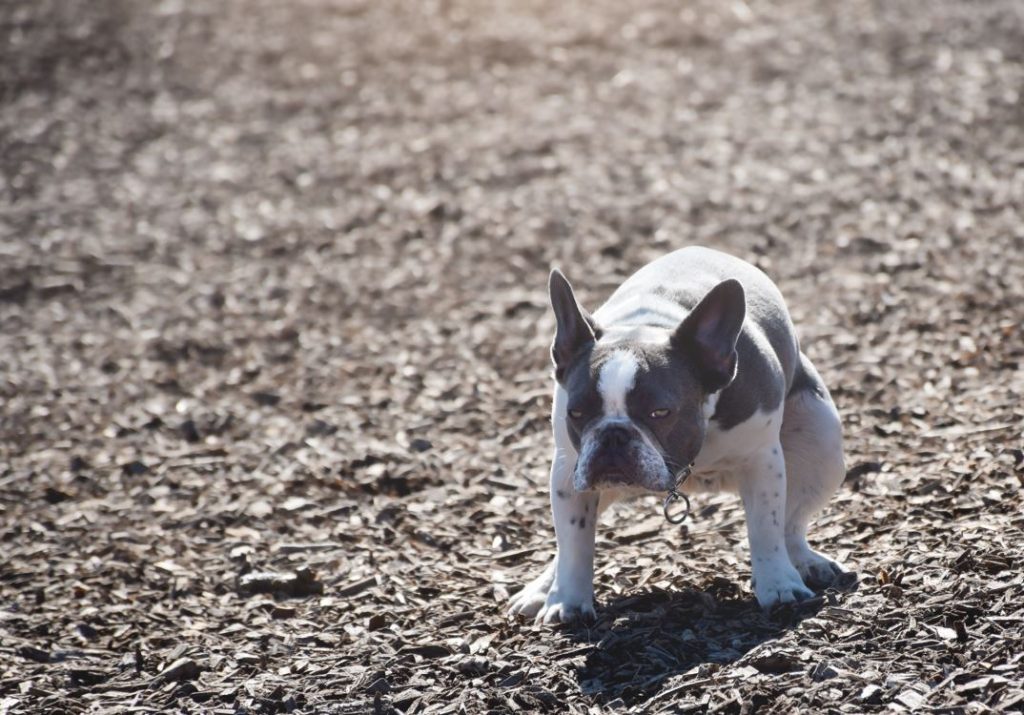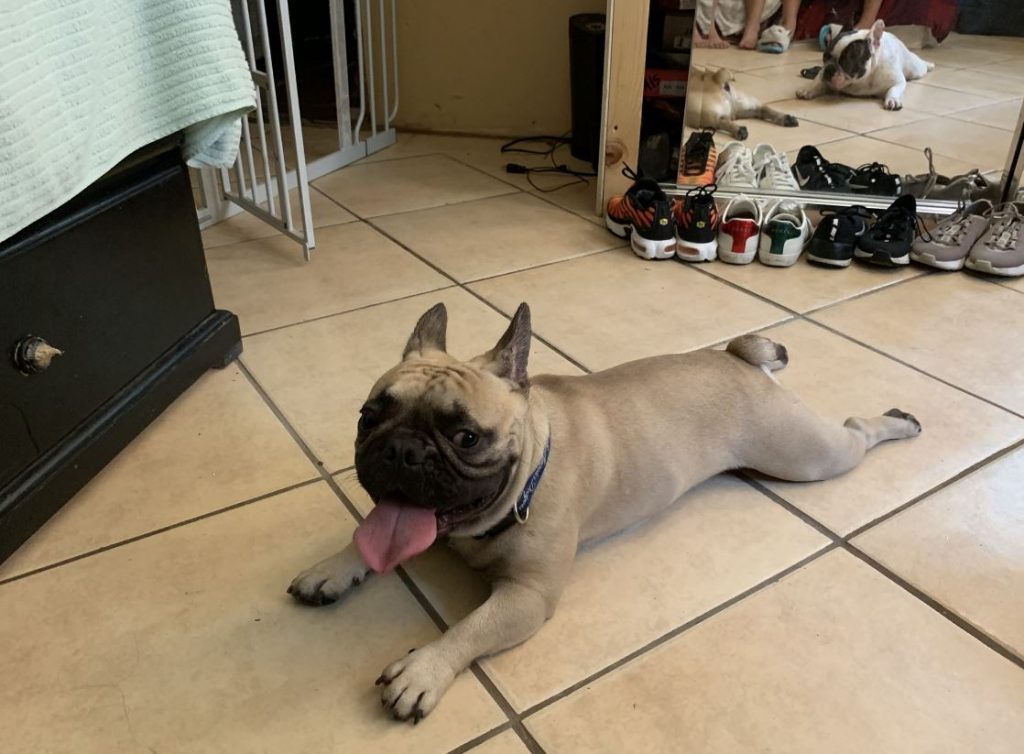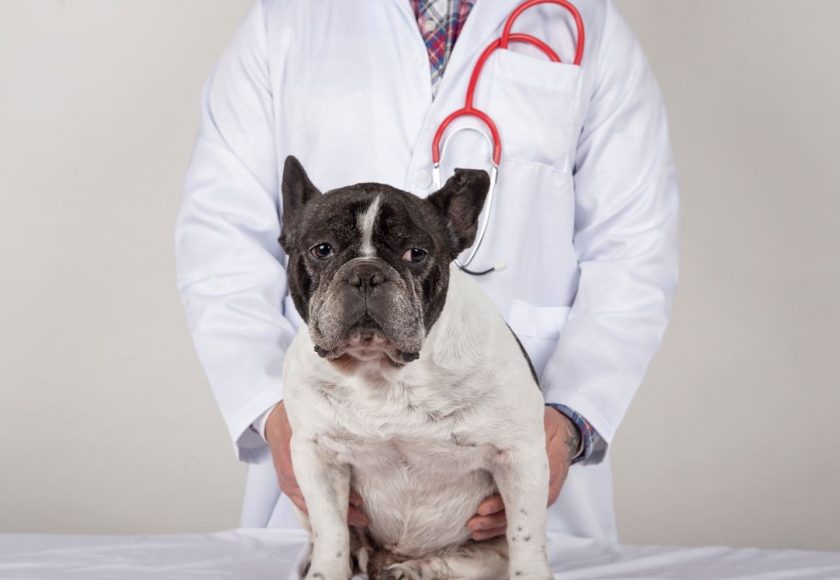It is always hard to see your Frenchie feeling unwell, but the mere sight of blood can send you into a panic frenzy! We’ve all been there.
One of the most common questions that have to do with this topic is:
My French bulldog is bleeding from the anus; what to do?
Well, first and foremost:
Don’t panic!
Even though bleeding from the rectum can be a sign of a severe condition, that’s not always the case. And the thing is, you cannot help your dog if you lose your composure.
The best solution is to be prepared for all sorts of situations. We’ll tell you what to expect and do when you notice blood in your Frenchie’s stool so that you can act in your pet’s best interest.

Anal Bleeding in French Bulldogs: Symptoms & Causes
Of course, the most prominent symptom is the actual blood in the stool. Yet, not all bloody stools are the same, nor a reason for significant concern.
A single streak of blood in the otherwise normal-looking stool is likely not a sign of anything too severe. However, if it happens more than once, or you notice large amounts of blood, then yes – your Frenchie is potentially dealing with a more serious problem.
We advise contacting your vet in both cases. It’s better to be safe than sorry.
Types Of Bloody Stool
Your vet will likely ask you to describe the problem. For this reason, you should be able to identify two main types of bloody stool.
At the very least, it’ll save some precious time at the vet office. With your help, the vet can skip right to the diagnostic lab work – and come to a proper diagnosis more quickly.
Let’s see what these two types are and how can you tell the difference:
Hematochezia
If you notice fresh, bright red blood in your French bulldog’s stool, you’re probably dealing with hematochezia. This type of bleeding indicates that the problem is located in the lower digestive tract or colon.
Melena
Melena refers to the stool that contains old digested blood, which is much darker – almost black. It usually appears jelly-like, tarry, and sticky. This type of stool indicates bleeding higher in your dog’s intestines. It could also mean that your Frenchie has swallowed some blood.
Other Symptoms You Should Keep An Eye On
Here are some other symptoms to keep in mind:
- Changes in your Frenchie’s appetite (mainly loss of appetite)
- Attitude changes
- Changes in activity levels
- Scooting
- Vomiting
- Diarrhea,
- Weakness or lethargy
- Blood in the urine
- Difficulty breathing
Most Likely Causes Of Blood In Your Frenchie’s Stool
The cause of canine rectal bleeding can be something as trivial as minor irritation from eating some rich food or something as terrifying as a tumor. That’s why it’s always best to contact your vet as soon as you notice your dog has blood in the stool.
The most common conditions that cause bloody stool are:
- Hemorrhagic gastroenteritis (the cause is not known, but stress and hyperactivity increase the risk)
- Viral and bacterial infections
- Stomach ulcers
- Trauma to the gastrointestinal tract (often caused by eating bones)
- Foreign body ingestion (rocks, toys, fabric, etc.)
- Parvovirus
- Intestinal parasites
- Poisoning (the severity depends on the ingested toxin, usually plant or rat poison)
- Dog anal gland issues (anal sac impaction or anal gland abscess)
- Cancer (most often stomach or esophagus tumors)

What To Expect When You Take Your Frenchie To The Vet: Diagnostic Procedure, Treatment & Prognosis
As we have already established, you should take your Frenchie to the vet as soon as you notice traces of blood in the stool. Now, let’s see what happens there.
The cause could be somewhat challenging to diagnose; expect anything from routine diagnostic procedures to more invasive diagnostic testing.
Here are some usual steps:
Taking Medical History
The vet will most likely ask you for a complete medical history of your French bulldog. With that said, going to the same vet that you generally visit could save you some explaining and, in turn, precious time.
Physical Examination
It would be great to bring a sample of the bloody stool. If you’ve remembered to do that, the vet will probably start the examination with a visual observation of the stool.
The typical steps include the palpitation of the abdomen to check for any signs of obstruction or pain, checking cardiovascular function, a dog skin test to ensure your pooch isn’t dehydrated, and examining your Frenchie’s mucus membranes for potential hemorrhagic losses.
Running The Necessary Diagnostic Tests
The chances are that the basic examination won’t suffice here, and the vet will have to run some additional diagnostic testing.
On that note, the vet might perform some of the following tests:
- Routine blood tests
- Biochemical tests (liver, blood sugar)
- Fecal exam
- Microscopic examination of the bloody stool (looking for parasites or microbiological organisms)
- Tests that rule out hemorrhagic gastroenteritis as a cause (packed cell volume data)
- Endoscopy or radiography for pinpointing potential physical obstructions, intestinal blockages, ulcers, or tumors
Treatment & Prognosis
Once the vet comes to a definite diagnosis, they will prescribe adequate treatment. You should not do anything on your own!
The treatment will vary depending on the symptoms and the actual cause of your pooch’s anal bleeding. And the prognosis of recovery will depend on the cause, as well.
For example, if the condition is caused by intestinal parasites, viruses, bacteria, or something ingested by accident, your best friend should recover pretty quickly after the initial treatment.
If your pooch has a tumor, though, the vet’s prognosis will be more guarded.
The most common therapy includes:
- Electrolyte and fluid therapy (mainly when the bleeding is caused by hemorrhagic gastroenteritis)
- Medications that soothe your Frenchie’s intestines
- Antibiotic therapy for infections
- Anthelmintics for parasitic infections
- Corticosteroid therapy in the case of hypovolemic shock
- Surgical interventions (removing physical obstructions, tumors, or ulcers)
Will Your Frenchie Be OK?
We sure hope so.
If you keep your calm, take your Frenchie to the vet, and start the proper treatment as soon as possible, the chances of success are as high as they can be.
Dogs generally respond well to therapy and recover more quickly than humans. Still, give your Frenchie enough healing time to recover fully.
With a little bit of luck, the two of you will return to your favorite activities in no time!




